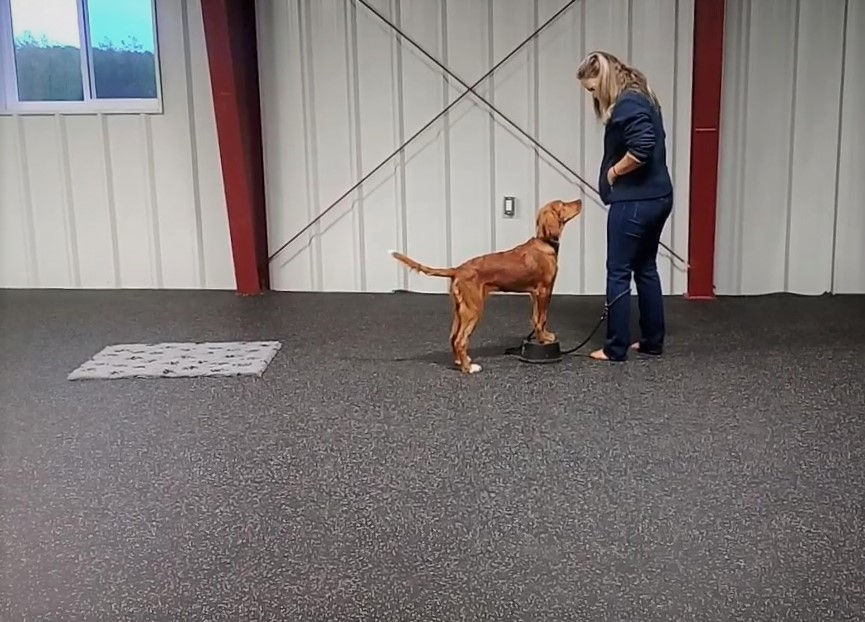Why We "Teach First Things First" Instead of Traditional Obedience
- Jamie Veraldi

- Oct 31, 2022
- 4 min read
When we first bring our young puppies home between the age of 8 to 16 weeks they are in what is commonly termed the Critical Socialization Period. During this period they are developing social attachments to those they interact with and are learning about their environment. This is a time where they are soaking up information like a sponge and where learning comes easiest for them, but they are also in a stage where they begin to develop caution and fear. By tailoring our interactions to be positive in nature and by providing them with age appropriate challenges in a safe learning environment, we can proactively use this brief window of opportunity to build strong healthy relationships and give them confidence in their environment. With our older puppies in the Juvenile Stage ,we need to be just as mindful if not mores so of providing structure and training in a safe and positive environment. Our goal will always be to ensure we are strengthening the behaviours we want and minimizing the behaviours we wish to decrease. A mentally and physically stimulated puppy raised in a safe, structured environment and trained with positive reinforcement is a happy puppy!
Traditional, Correction Based Training In the past when I first started out in dog sports the acceptable way to train was to use the carrot and the stick. Back then it was the belief that we could use the occasional treat to initially lure a behaviour but compulsion by physical manipulation and abrupt corrections was the only way to ensure we raised and trained a reliably well mannered dog. At that time, dog trainers and pet owners just accepted compulsion training as the only way to teach our dogs rather then trusting what we were seeing in their happy demeaner and quick to comply responses to positive reinforcement and their subdued, hesitant responses to the corrections that they did not understand, for behaviours they did not know how to do. I will not tell you corrections don't work because they do but, that is not the type of foundation I want to build my relationship on with my dogs. I believe todays dog owners know more then we did back then so they also don't want to lay their relationship foundation that way either. What Comes First?
I named my classes First Things First because in order to get the advanced behaviours of loose leash walking, reliable recalls and a dog that can settle quietly in the home when needed, we must first give our puppies a solid foundation upon which to work with and to provide them with the opportunities they will need to develop a love for training with us. Attention and Focus really is the mother of all behaviours and it is a foundation behaviour that must be freely offered by our puppies if we don't want it to break down under life's distractions. In order to get freely offered Attention and total Focus we must first teach it and the simplest way to do that is to either capture it or break it down into smaller components and shape it. Once we have our puppies undivided attention we have begun to develop our skills and knowledge on how to shape our puppies into offering us other behaviours that we want to see repeated such as, hand touches, stationing on a mat or platform, whiplash recalls etcetera. The possibilities really are endless! A Conditioned Emotional Response Builds Strong Behaviours
What gets Rewarded, gets Repeated. When we pair a high rate of positive reinforcement to a behaviour, a Conditioned Emotional Response develops for that behaviour. We apply that principle to everything we teach in frequent but very short 1 to 2 minute training periods. This sets learning up to be fun and rewarding for both our puppies and for ourselves. Gone are the days of trying to find an hour every day to train our puppies which generally just resulted in stressed out owners feeling guilty for not finding the time to train and stressed out dogs being taught what not to do rather then what to do.
Do we use a lot of food in our training? Yes we do! We also use games, toys, laughter, affection and praise. This allows us to start formally training our puppies at a very early age. Since it is the dog who decides what is reinforcing, we begin by using high value food rewards in the initial stages of teaching a behaviour, a CER is developed towards that behaviour through that reward and the value of that CER is transferred to us. We become the biggest reinforcer of all! I absolutely LOVE this video clip. I don't think Tammy knew I was going to plaster it everywhere but that wonderful moment of pure joy in this clip says it all.
Puppy Primer and Puppy Focus I personally know the value training classes brings to our puppies in terms of providing them with new experiences and age appropriate challenges outside of the home environment. I can get lovely behaviours and complete attention and focus in my home setting but without proofing those behaviours elsewhere such as in a class setting there would be a large gap in our training. The First Things First Puppy Primer class for young puppies and the Puppy Focus class aims to fill that gap for our class participants. Come Love, Laugh, Learn With Us At The Callander Canine Centre!




Comments